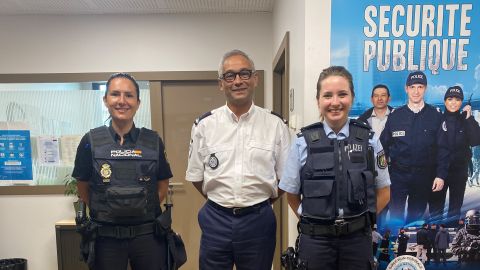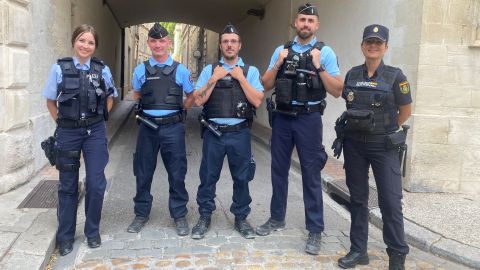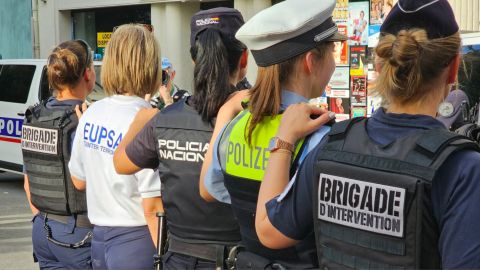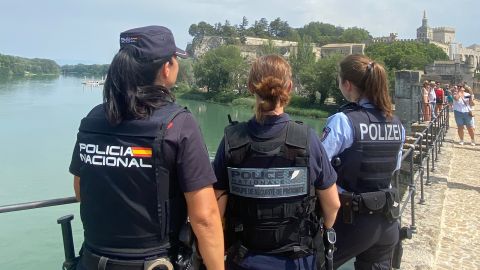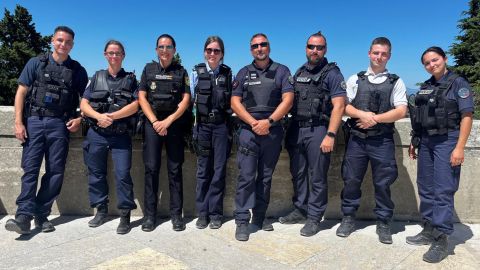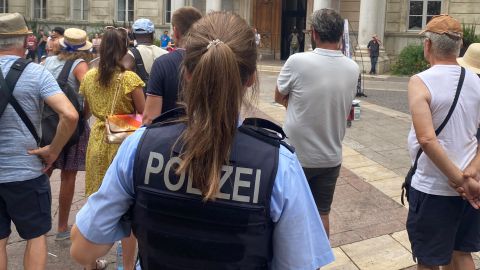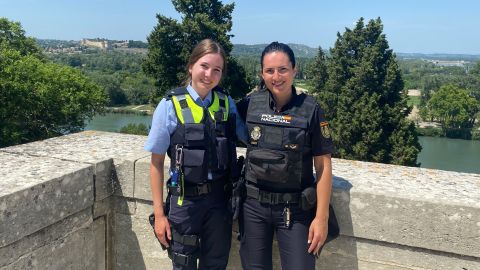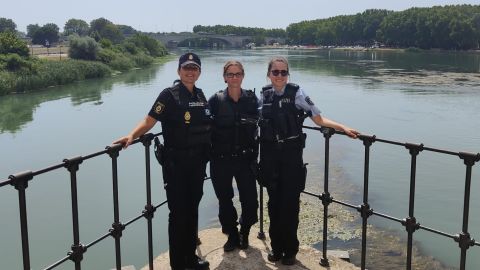Before the stay
Before submitting my application for an assignment abroad in France, I read with great enthusiasm the testimonials of colleagues who had already been able to take part in such a mission as part of the European Commissariats. This aroused my interest in my professional and personal career. After successfully passing the selection procedure of the Ministry of the Interior of North Rhine-Westphalia, it was clear to me where the journey would take me - AVIGNON. A city steeped in history with a lot of charm in Provence. This year, the internationally renowned theater festival took place between July 5 and 29, and European police forces were called in to ensure the safety of the tourists, among other things. As a police task on site, the foreign forces are primarily intended to serve as language mediators.
How to get there
On July 4, the time had finally come. My journey began with a train ride to Cologne airport. From there I flew to Nice, where a French policeman from the Police Nationale picked me up. I was allowed to work for the Police Nationale for the next few weeks. Inspired by the Côte d'Azur, I was on my way to Avignon. During the trip, I was given an overview of the beautiful Provence. I also learned that I would not be the only foreign police officer in Avignon. A Spanish colleague would be spending time with me in Provence. When I arrived at the police station, I was warmly welcomed. After the organizational matters had been discussed, I went on an exploratory tour of the city.
My first day at work in the historic city of AVIGNON
My first day at work began with a French breakfast with my new friend Sonia, my Spanish colleague, with whom I naturally only communicated in French. We excitedly went to the commissariat together, because the Avignon Theater Festival was about to open. Over the next few weeks, 1540 plays will have taken place at 200 locations and thousands of artists and more than a million spectators will have attended the festival.
The Police Nationale and we, our European colleagues, led the opening parade. In addition to curious glances, we were often approached and asked why we were in France. Surely we are not actors? In fact, this question came up more than once. After a successful first day, I was already looking forward to the next one, as we would get to know our service group for the next few weeks.
My day-to-day work, my area of responsibility, my stay
Before our arrival, the situation in France was tense. However, the Police Nationale and we were warmly welcomed by the locals and tourists. Sonia and I supported the GSP (Groupe de sécurité de proximité) on their daily patrols around the city. We not only got to know our colleagues well, but also the urban area. Among other things, we saw the famous Pont d'Avignon, the Papal Palace and the city hall.
Sonia and I spent our time in France with two GSP service groups. On the very first day, we were warmly welcomed and treated as full members of the GSP. We were introduced to all areas of responsibility and had our first discussions about the police work of the countries (France, Spain and Germany). It turned out that the police forces of the countries were similar in their work, if not very similar. Even if the organization differs to some extent, each of us faces the same challenges in our daily work. And so the first working day with the GSP was drawing to a close. After the first day on patrol, we not only walked 14 km in 35 degrees, but also learned a lot about the police forces of the different nations and laughed a lot together. My worries that I might not understand my colleagues in France or that they might not understand me were completely unfounded. My colleagues were very pleased with my language skills.
What followed was more than twenty days of patrols, culture, new friendships and an enormous heatwave. Every day we spent in the service group was a complete success. Most of the time, duty began around midday and ended in the evening. In addition to official matters, private tips and tricks for a successful stay in France were quickly shared. During this period, I was not only to experience various situations with tourists, but also normal everyday police life. In addition to people in need of help, we also had to deal with aggressors. In one such situation, I realized that police interventions are very similar to those of European police forces. Despite possible language barriers, everyone knew how to act in this situation. Sometimes the generally accepted non-verbal communication is enough.
We were able to experience new things every day. Because of the festival, it wasn't just police officers from Avignon who were there. We got to talk to the gendarmerie, police officers from neighboring towns and even the military. On one day, we met a large group of police students, and on another, reservists who had also signed up for the duration of the festival.
Even after the service, we learned a lot about the work on site. As Sonia had already completed a foreign assignment in Nîmes, we were given the opportunity to meet up with her former colleagues. As well as the police in Avignon, I also got to know police officers from Nîmes and other members of the gendarmerie. I will always remember the diversity of the command and operational resources.
The theater festival aroused not only my professional but also my personal interest in going to see a play with my colleagues one evening. One day, we even managed to meet Sebastian, a colleague from Bochum, who was on duty for NRW in the neighboring city of Orange during the same period.
Thankfulness
During this one month in France, I was able to gain a lot of experience and take this back with me and certainly also for my authority. It is a great honor for me to be able to represent the German police, North Rhine-Westphalia and my agency, the Minden-Lübecke district police authority, in France. I will always remember the assignment abroad as an extremely positive experience, both professionally and personally, and it has definitely enriched me and my life as a police officer. I share the view that bilateral or European exchange programs in the context of foreign assignments will continue to be of great importance in the future. I am grateful that I was able to contribute to a common Europe within the framework of the European Commissariats.
In particular, I would like to thank my department and my colleagues who have supported me despite the significant additional workload.
Merci beaucoup et à bientôt!
